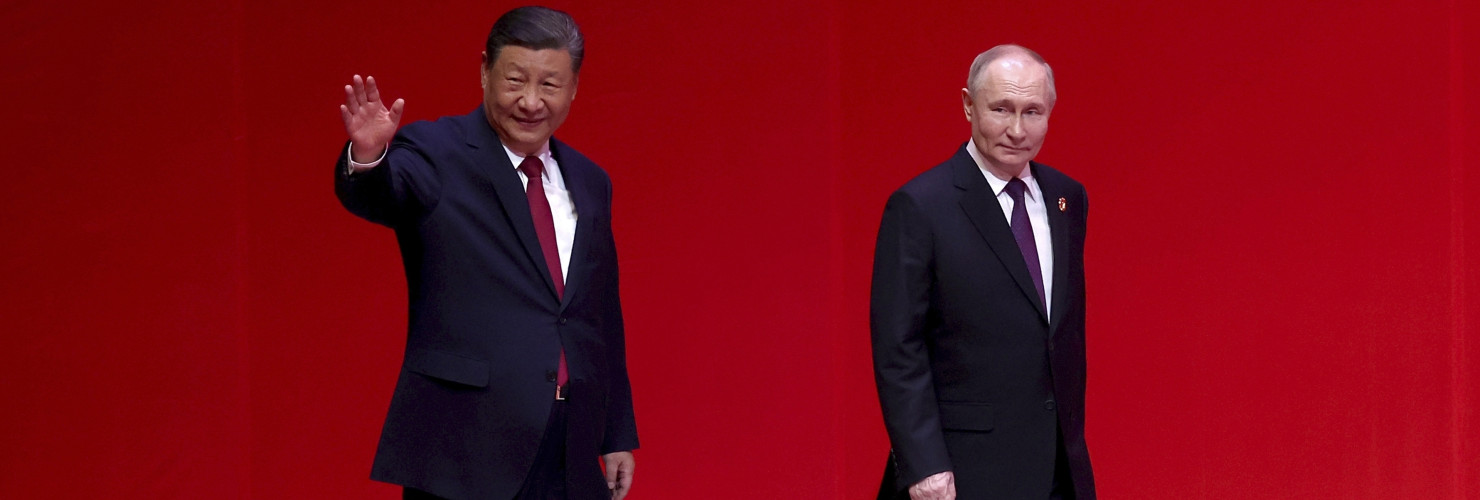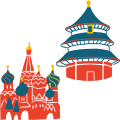

It’s time for the EU to get tough on China for supporting Russia’s war on Ukraine
Xi’s warm welcome to Putin last week showed that Beijing remains impervious to European pleas for China to help pressure Moscow into ending its aggression, says Eva Seiwert.
The European Union more than ever needs to make relations with China dependent on Beijing’s stance towards Russia’s war on Ukraine. Days after visiting Europe, China’s President Xi Jinping on May 16-17 hosted Vladimir Putin on his first foreign trip after becoming re-elected Russian president. Instead of China using “all its influence” to end Russia’s aggression, as EU Commission President Ursula von der Leyen had urged, Xi joined Putin in signing a 7000-word joint statement, in which they reaffirmed their ambitions “to increase interaction and tighten coordination” to end the US-led “dual containment” of their countries.
Taking place so soon after Xi’s first visit to Europe in five years, Putin’s visit to China was always going to be as much an indicator of EU-China relations as of the state of the Xi-Putin “bromance”. It is not surprising that Putin chose China as his first destination at the start of his fifth presidential term – Xi traveled to Moscow right after securing his third term in March 2023. Their latest meeting – of which there have been more than 40 since 2013 – showed that China’s president continues to value his partnership with the man he has called his “best friend” and is willing to ignore direct and very public pressure from EU leaders to show this.
Pleas from the EU have failed to move China even slightly from Russia’s side
Europe’s – admittedly, long-shot – hope that Xi might use the occasion to distance himself from Putin was based on the perception that China’s relationship with Russia is not immune to pressure. Bilateral trade grew from USD 145 billion in 2021 to USD 240 billion in 2023, but China’s exports to Russia were over 15 percent lower in March 2024 than in the same month the year before – a sign that Beijing and Chinese companies are wary of being hit with secondary sanctions from the US and EU should they directly support Russia’s war machine.
But even if China has moved away from referring to the bilateral relationship as having “no limits” – a description Xi and Putin first used only weeks before Russia invaded Ukraine – China’s purchases of Russian discounted oil and gas, as well as sales of dual-use goods are at least indirectly helping Russia sustain its war efforts. Last year, Russia exported a record 2.14 million barrels of oil per day to China and reportedly imported 90 percent of its “high priority” dual-use goods used for weapons production from China. US officials have recently claimed these exports include drone and missile technology, satellite imagery, and machine tools.
A core tenet of the Xi-Putin relationship has always been their shared worldview and ambition to reshape the international order – and their most recent meeting shows that China has not budged an inch. Last week’s “China-Russia Joint Statement on Deepening the Comprehensive Strategic Partnership of Coordination for the New Era in the Context of the 75th Anniversary of China-Russia Diplomatic Relations” (中华人民共和国和俄罗斯联邦在两国建交75周年之际关于深化新时代全面战略协作伙伴关系的联合声明) calls the US an unfair global hegemon that “undermines strategic stability to maintain its absolute military superiority“.
On Ukraine, the joint statement repeated Russia’s contention that a new international order needs to take the “legitimate security interests and concerns of all countries into account”. Furthermore, Putin visited the Harbin Institute of Technology (HIT), one of China’s “Seven Sons of National Defense” (国防七子) that was sanctioned by the US in 2020 for its military ties. This was widely read as a joint signal that US sanctions won’t thwart their military co-operation and that Russia’s access to Chinese defense technology will grow further.
Europe should consider more restrictions on the export of dual-use goods
Putin’s visit to China, in short, shows that the China-Russia relationship is solidifying, irrespective of recent pressure from European leaders, including a warning from the EU Commission president that Russia’s war on Ukraine was an “existential threat” to Europe. To maintain credibility, Europe now has to follow on von der Leyen’s repeated statement that China-Russia ties will have an impact on Europe’s relations to China. Beyond sharpening its rhetoric, the EU should look into extending sanctions – and specifically at restricting the export of dual-use products (and monitoring member states’ implementation closely).
At the same time, Europe should not ignore the small wins that China has achieved with Russia for its own sake. Xi got Putin to concede in their joint statement that “nuclear war cannot be won and cannot be fought” and told his Russian guest that he hoped the war would be settled “at an early date”, with China ready to “play a constructive role”. This shows that China’s position is not set in stone, and that Europe should not tire of communicating its own position regarding the Russia-Ukraine war to Beijing in words and deeds.

